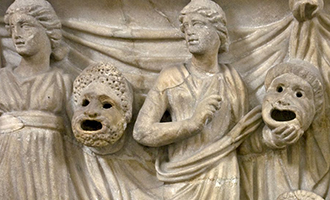
Classics and English
Course overview
UCAS code: QQ38 (Classics and English); QQH8 (Classics and English with Beginners' Latin or Greek)
Entrance requirements: AAA (with As in Latin and Greek if taken)
Course duration: 3 years BA in Classics and English; 4 years BA in Classics and English with Beginners' Latin or Greek
Subject requirements
Required subjects: English Literature or English Language and Literature
Recommended subjects: Not applicable
Helpful subjects: Latin, Ancient Greek, Classical Civilisation, Ancient History or a modern language
Other course requirements
Admissions test: None
Written Work: Two pieces
Admissions statistics*
Interviewed: 89%
Successful: 24%
Intake: 13
Successful for a different course: 8%
Applicant intake for a different course: 5
*3-year average 2023-25
Classics contact
Tel: +44 (0) 1865 288391
Email: [email protected]
English contact
Tel: +44 (0) 1865 271055
Email: [email protected]
Unistats information for each course combination can be found at the bottom of the page
Please note that there may be no data available if the number of course participants is very small.
About the course
The Classics and English degree at Oxford gives students the opportunity to study the literature and culture of the ancient and modern world, both separately and in comparison; to trace ideas, forms, and genres across cultures and time; and to think about continuities and change in how people think, write, and imagine their world.
All students study either Latin or Greek or both, so that they can encounter ancient literature in the original language(s).
Candidates with an A-level or equivalent in either Latin or Greek take a three-year course.
Candidates who have not had the opportunity to study either classical language to A-level or equivalent take Classics and English with Beginners’ Latin or Greek. This is a four-year course which includes a preliminary year, in which students learn Latin or Greek alongside some study of classical literature.
You can choose to specialise in what you find most interesting from each side of the course, taking a range of options in English literature, and in ancient literature, history, philosophy, and linguistics. But the degree also integrates the two sides of its course, offering several papers designed specifically for the kind of comparative work that the course encourages.
In the first year (second, for Classics and English with Beginners' Latin or Greek), students take a paper in English literature of the sixteenth and seventeenth centuries – the period during which writers were most consistently and intensely engaged with the languages and literatures of ancient Greece and Rome.
Among the highlights of the latter two years are the four ‘link papers.’ All students take Epic, and read and compare authors such as Homer, Virgil, Milton, Alice Oswald, and Derek Walcott. Students then choose to take either Comedy, Tragedy, or Reception (in which you study the reception of ancient literature in 20th-century poetry). Students who choose to take up a second classical language in their penultimate year only take one of the link papers.
The final-year dissertation allows students to pursue an independently devised topic with an expert supervisor, which may combine the subjects or focus on an aspect of one of them. All of the courses allow students to pursue the twists and turns of literary genres across time.
Oxford has a long and distinguished tradition of research and teaching in both Classics and English, and possesses remarkable library provision in both subjects.
Oxford has the largest Classics department in the world, with over sixty full-time academic staff members. It has outstanding teaching, library and museum resources. Resources include the Bodleian and Bodleian Art, Archaeology and Ancient World Libraries, the Ashmolean Museum and a designated Classics Centre.
The English Faculty is the largest English department in Britain. Students are taught in tutorials by scholars active in their research field, many of whom also give lectures to all students in the English Faculty. You will therefore have the opportunity to learn from a wide range of specialist teachers.
Library provision for English at Oxford is exceptionally good. All students have access to:
- the Bodleian Library (with its extensive manuscript collection)
- the Humanities Library
- their own college libraries
- and a wide range of electronic resources.
Astrophoria Foundation Year
If you’re interested in studying Classics and English but your personal or educational circumstances have meant you are unlikely to achieve the grades typically required for Oxford courses, then choosing to apply for Classics and English with a Foundation Year might be right for you.
Please visit our Foundation Year course pages for more details.
 |  |  |
'I was able to learn Ancient Greek from scratch here. It didn’t come naturally to me, but with an hour-long class almost every day for a year I was doing prose composition by my third term. Doing a joint honours course allows you to bring different perspectives to all of your subjects. Thinking about Renaissance literature with knowledge of the Classics means you have a very different perspective from someone studying straight English, for example. It’s a unique kind of literary criticism. If you think idiosyncratically and are interested in everything, then this is definitely the course to do.' Emma | 'Classics & English at Oxford is an excellent course for those who have a real interest in how the two subjects interact; not only through the fascinating range of link papers available, but also through the number of other papers associated with only one half of the course. There is so much choice, and such personalised teaching due to the small year size, that there are always opportunities to specialise in your own interests, which is a real privilege. I have also been able to study both Greek and Latin from scratch since starting at Oxford, which makes for a deep understanding of classical and modern languages, and a far richer understanding of literature.' India | 'The Classics and English link papers really set the course apart from equivalent courses at other universities, allowing you to get a real sense of how classical texts have influenced English ones, and how writers in English have responded to classical texts. My favourite paper was probably one that focused on classical receptions in twentieth-century poetry, for which I wrote an extended essay on 1960s plays by Nigerian playwrights that were adaptations or translations of Greek plays, which really brought home to me the persistent relevance of classical literature and the continuing power of the classical world to express and explore modern tensions.' Francesca |
Unistats information
Discover Uni course data provides applicants with Unistats statistics about undergraduate life at Oxford for a particular undergraduate course.
Please select 'see course data' to view the full Unistats data for Classics and for English.
Please note that there may be no data available if the number of course participants is very small.
Visit the Studying at Oxford section of this page for a more general insight into what studying here is likely to be like.
A typical week
A typical week is structured around two tutorials in different subjects, with the rest of your time divided between lectures, classes (including language classes) and private study. Most of your work will be preparation of essays for tutorials (you will be expected to produce between eight and twelve pieces of written work during a term); however, language-learning and reading will also require considerable time. Much of your teaching will take place in your college, but you will typically attend three to four lectures a week in either faculty.
Tutorials are usually up to three students and a tutor. Class sizes may vary depending on the options you choose. There would usually be no more than around 15 students. Most tutorials, classes, and lectures are delivered by academics who are specialists in their subject. Many are world-leading experts with years of experience in teaching and research. Some teaching may also be delivered by qualified postgraduate students studying at doctoral level.
This table is a summary of the three-year course. Candidates who have not had the opportunity to study either classical language to A-level or equivalent have a preliminary year studying Latin or Greek, and then follow the structure outlined below.
To find out more about how our teaching year is structured, visit our Academic Year page.
Year 1
Courses | Assessment |
|---|---|
Students taking Classics and English with Beginners’ Latin or Greek spend a preliminary year learning Latin or Greek, alongside some study of classical literature. In order to progress to Year 1, these students must pass (or, in exceptional circumstances, be exempted from) the University examinations at the end of the preliminary year. After progressing to Year 1 they follow the same programme as other Classics and English students. Five papers are taken:
| Students taking Classics and English with Beginners’ Latin or Greek take two written papers at the end of the preliminary year. Four written papers form the first University examination, together with a submitted portfolio of two essays for Introduction to English language and literature. All exams must be passed, but marks do not count towards the final degree. |
In order to progress to Years 2 and 3, students must pass (or, in exceptional circumstances, be exempted from) the first University examinations at the end of Year 1.
Years 2 and 3
Courses | Assessment |
|---|---|
Seven papers are taken:
| Up to three papers examined as coursework (extended essays and dissertation). The remaining papers will then be examined by final written examinations. |
The content and format of this course may change in some circumstances. Read further information about potential course changes.
Academic requirements
Qualification | Requirement |
|---|---|
A-levels: | AAA (with As in Latin and Greek, if taken) |
Advanced Highers: | AA/AAB (with A in Latin, if taken) |
International Baccalaureate (IB): | 39 (including core points) with 666 at HL, including 6s at HL in Latin and Greek, if taken. |
Any other equivalent qualification: | View information on other UK qualifications, and international qualifications. |
Wherever possible, your grades are considered in the context in which they have been achieved.
Read further information on how we use contextual data.
Subject requirements
Essential | Candidates are expected to have English Literature, or English Language and Literature, to A-level, Advanced Higher, Higher Level in the IB or any other equivalent. |
|---|---|
Helpful | Either or both classical languages (Latin and Ancient Greek), Classical Civilisation, Ancient History or a modern language can be helpful to students in completing this course, although they are not required for admission. |
If a practical component forms part of any of your science A‐levels used to meet your offer, we expect you to pass it.
If English is not your first language you may also need to meet our English language requirements.
If your personal or educational circumstances have meant you are unlikely to achieve the grades listed above for undergraduate study, but you still have a strong interest in the subject, then applying for Classics and English with a Foundation Year might be right for you.
Visit the Foundation Year course pages for more details of academic requirements and eligibility.
Applying
All candidates must follow the application procedure as shown on our Applying to Oxford pages.
The following information gives specific details for students applying for this course.
Admissions test
You do not need to take an admissions test as part of an application for this course.
Written work
Description: | Two pieces of written work, where possible one relevant to Classics and one to English. Candidates will preferably not submit short, timed essays or exercises answering questions on a short passage of text. Please view the written work requirements for both English Language and Literature and Classics for further guidance. |
|---|---|
Submission deadline: | 10 November 2026 |
Read our further guidance on the submission of written work for general guidance.
What are tutors looking for?
Tutors are looking for curious, independent students with a real commitment to the wide-ranging study and comparison of literatures. Written work helps us to gauge your analytical skills, and your writing.
Successful candidates will be expected to display general language aptitude, including competence in Latin or Greek if they are studying the classical language(s) to A-level or equivalent.
Interviews allow us to explore your enthusiasm for literature and the comparative aspects of the course, your response to new ideas and information, and your independent thinking and reading.
We expect you to have read widely in English and classical literature (in translation or in the original), and to have an appetite for talking and writing about literature and approaches to it. However we are not looking for any reading in particular: we are interested in your own ideas, interests, and in seeing how you think.
Visit the Classics website and English website for more detail on the selection criteria for this course.
Careers
Many graduates in Classics and English have entered a wide range of different fields such as:
- teaching
- the media
- management consultancy
- the law
- finance
- advertising
- journalism
- writing
- librarianship
- or have continued to further study in one or both subjects.
Philip, now a writer, says:
‘Since graduating I have embarked on a career in writing and journalism. I have published two novels, write for a wide range of magazines and papers, and am a Contributing Editor to Literary Review, the Periscope Post and Port. My degree helped me develop the analytical, presentational and linguistic skills that are paramount in the media world.’
We don't want anyone who has the academic ability to get a place to study here to be held back by their financial circumstances. To meet that aim, Oxford offers one of the most generous financial support packages available for UK students and this may be supplemented by support from your college.
Fees
Please note that for full-time Home undergraduate students, current university policy is to charge fees at the level of the cap set by the government, which for 2026/27 is £9,790. For details of annual increases, please see our guidance on likely increases to fees and charges. In the 2027/28 academic year course fees for Home fee status students will rise to £10,050 (in line with the government fee cap).
Fee status | Annual Course fees |
| Home | £9,790 |
| Overseas | £43,600 |
Further details about fee status eligibility can be found on the fee status webpage.
For more information please refer to our course fees page. Fees will usually increase annually. For details, please see our guidance on likely increases to fees and charges.
Living costs
Living costs at Oxford might be less than you’d expect, as our world-class resources and college provision can help keep costs down.
Living costs for the academic year starting in 2026 are estimated to be between £1,405 and £2,105 for each month you are in Oxford. Our academic year is made up of three eight-week terms, so you would not usually need to be in Oxford for much more than six months of the year but may wish to budget over a nine-month period to ensure you also have sufficient funds during the holidays to meet essential costs. For further details please visit our living costs webpage.
Financial support
Home | A tuition fee loan is available from the UK government to cover course fees in full for Home (UK, Irish nationals and other eligible students with UK citizens' rights - see below*) students undertaking their first undergraduate degree**, so you don’t need to pay your course fees up front. In 2026 Oxford is offering one of the most generous bursary packages of any UK university to Home students with a family income of around £50,000 or less, with additional opportunities available to UK students from households with incomes of £32,500 or less. The UK government also provides living costs support to Home students from the UK and those with settled status who meet the residence requirements. *For courses starting on or after 1 August 2021, the UK government has confirmed that EU, other EEA, and Swiss Nationals will be eligible for student finance from the UK government if they have UK citizens’ rights (i.e. if they have pre-settled or settled status, or if they are an Irish citizen covered by the Common Travel Area arrangement). The support you can access from the government will depend on your residency status. |
Islands | Islands students are entitled to different support to that of students from the rest of the UK. Please refer the links below for information on the support to you available from your funding agency: |
Overseas | Please refer to the "Other Scholarships" section of our Oxford Bursaries and Scholarships page. |
**If you have studied at undergraduate level before and completed your course, you will be classed as an Equivalent or Lower Qualification student (ELQ) and won’t be eligible to receive government or Oxford funding
Additional Fees and Charges Information for Classics and English
There are no compulsory costs for this course beyond the fees shown above and your living costs.
Visit the Classics and English pages for KIS data for this course.
Contextual information
Unistats course data from Discover Uni provides applicants with statistics about a particular undergraduate course at Oxford. For a more holistic insight into what studying here is likely to be like, please view the information below and explore our website more widely.
The Oxford tutorial
College tutorials are central to teaching at Oxford. Typically, they take place in your college and are led by your academic tutor(s) who teach as well as do their own research. Students will also receive teaching in a variety of other ways, depending on the course. This will include lectures and classes, and may include laboratory work and fieldwork. However, tutorials offer a level of personalised attention from academic experts unavailable at most universities.
During tutorials (normally lasting an hour), college subject tutors will give you and one or two tutorial partners feedback on prepared work and cover a topic in depth. The other student(s) in your tutorials will typically be doing the same course as you and covering the same topic. Such regular and rigorous academic discussion develops and facilitates learning in a way that isn’t possible through lectures alone. Tutorials also allow for close progress monitoring so tutors can quickly provide additional support if necessary.
Read more about tutorials and an Oxford education
College life
Our colleges are at the heart of Oxford’s reputation as one of the best universities in the world.
- At Oxford, everyone is a member of a college as well as their subject department(s) and the University. Students therefore have both the benefits of belonging to a large, renowned institution and to a small and friendly academic community. Each college or hall is made up of academic and support staff, and students. Colleges provide a safe, supportive environment leaving you free to focus on your studies, enjoy time with friends and make the most of the huge variety of opportunities.
- Each college has a unique character, but generally their facilities are similar. Each one, large or small, will have the following essential facilities:
- Porters’ lodge (a staffed entrance and reception)
- Dining hall
- Lending library (often open 24/7 in term time)
- Student accommodation
- Tutors’ teaching rooms
- Chapel and/or music rooms
- Laundry
- Green spaces
- Common room (known as the JCR).
- All first-year students are offered college accommodation either on the main site of their college or in a nearby college annexe. This means that your neighbours will also be ‘freshers’ and new to life at Oxford. This accommodation is guaranteed, so you don’t need to worry about finding somewhere to live after accepting a place here, all of this is organised for you before you arrive.
- All colleges offer at least one further year of accommodation and some offer it for the entire duration of your degree. You may choose to take up the option to live in your college for the whole of your time at Oxford, or you might decide to arrange your own accommodation after your first year – perhaps because you want to live with friends from other colleges.
- While college academic tutors primarily support your academic development, you can also ask their advice on other things. Lots of other college staff including welfare officers help students settle in and are available to offer guidance on practical or health matters. Current students also actively support students in earlier years, sometimes as part of a college ‘family’ or as peer supporters trained by the University’s Counselling Service.
Connect with us
Outreach programmes and events
The Faculty of Classics runs dedicated outreach programmes, events and activities aimed at promoting the interdisciplinary study of ancient Greece and Rome and supporting talented students from all backgrounds to apply to the course.
Programmes and subject-specific resources
The Outreach section of the Classics Faculty website features a wide range of resources, including advice on applying and on how to prepare to study Classics at university, details of the different courses available at Oxford, interviews with current students in Classics and on related courses, details of Open Days and relevant competitions, and information on the OxLAT (Oxford Latin Teaching) scheme for students in Years 9 and 10 at state schools where there is no Latin provision. Through the Classical Conversations programme, you can arrange a real or virtual visit from an Oxford academic to your classroom, and UK state schools can arrange to visit us in Oxford with talks at the Classics Faculty and handling sessions at the Ashmolean Museum and Bodleian Library.
UK state school students interested in classical subjects can apply to UNIQ, Oxford’s flagship outreach programme for students in their first year of further education. Each year, UNIQ provides over 1,500 students with the opportunity to experience Oxford teaching and receive application support.
Anyone interested in studying Classics at Oxford is encouraged to explore details of subject-specific opportunities and resources on the Faculty of Classics website. Please note that some outreach events may require advance booking or have specific eligibility criteria.
Department contact details
![]() +44 (0) 1865 288391
+44 (0) 1865 288391![]() [email protected]
[email protected]![]() www.classics.ox.ac.uk/outreach
www.classics.ox.ac.uk/outreach
University-wide events and resources
In addition to exploring department-run activities, we recommend checking out the outreach event calendar for upcoming University-wide events and other subject and college activities.
Subject-specific resources supporting supercurricular engagement for all ages can also be found via the University's Digital Resource Hub, suggested subject resources webpage and Oxplore, our online learning platform for 11-to-18-year-olds.
Prospective applicants can sign up to receive step-by-step support with their Oxford application.
Read more about Oxford's widening access initiatives and other ways to connect with us before applying.

